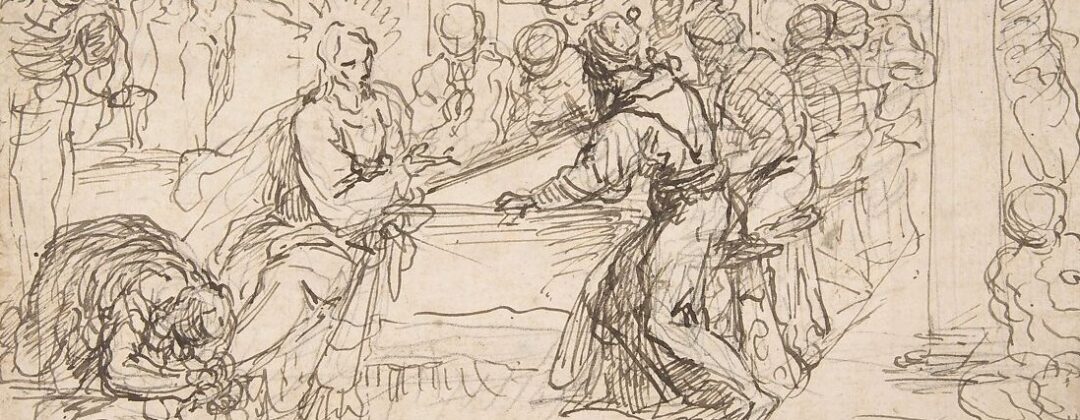The interview I reference with Dr. Joseph L. Graves of North Carolina A&T and UNC Greensboro can be found here.
Doubt and Faith
Doubt’s an odd thing. It’s a grey area between belief and unbelief—between two different kinds of certainty. It can be paralyzing, leaving us unable to act because we don’t know what to do. It can be liberating, freeing us to let go a false certainty to seek a true one. It can be unhealthy, especially if it becomes obsessive; it can also be healthy for us, reminding us we might not know quite as much as we think we do. It can be dishonest, a pretense to disguise a determination not to believe something—sometimes, to disguise that even from ourselves—but there is also such a thing as honest doubt, and doubt which is truly open to belief and truly seeking understanding can be an important prelude to true faith.
The problem is, true doubt is uncomfortable, like jogging in place on a waterbed. We want a solid place to stand. That’s why some churches treat doubt as a sin, as if believing in Jesus and following him are supposed to be easy—which they aren’t. I think that’s also why, when kids who grow up in the church have their faith challenged hard for the first time, they so often slide into disbelief like Jell-O off a steep metal roof. Doubt is uncomfortable, so our instinctive reaction is not to engage with it but to protect ourselves against it.Read more
At Break of Day
This lovely book by Nikki Grimes (author) and Paul Morin (illustrator) is a poetic reimagining of Genesis 1.
Songs for the Season
These are a couple by Rend Collective that I’ve been singing lately; they have something to say that I need to hear, and I’m sure I’m not the only one.
Sing it from the Shackles
Rescuer
The Sermon on the Mount as gospel
Additional comments on structure:
Paying attention to the structure of the Sermon on the Mount can be difficult, because it isn’t linear in its argument, and doesn’t flow the way essays and speeches in Western culture do. As a result, there’s little agreement among scholars on its structure—or even if it has one. Some, like W. D. Davies, go so far as to conclude that it has none at all, but is merely “an agglomeration of sources and even of snippets of tradition.” This allows us to read it as a disjointed jumble of topics with little real coherence or unity.
I believe the Sermon has a strong structure which makes sense if we understand and remember the common literary structures of the Old Testament, and particularly its use of parallelism. Parallelism of various types is common in the literature of the ancient world, both for aesthetic effect and as an aid to memory—which was of great importance in those largely pre-literate cultures. The Old Testament is no exception. Most simply, we see parallelism in individual verses, such as the step parallelism (AB A’B’ pattern) of Isaiah 28:17:
I will make justice the measuring line,
and righteousness the plumb line.
In verses like Isaiah 41:9, we see an AB B’A’ pattern, called inverted parallelism or chiasm:
I took you from the ends of the earth,
and from its farthest corners I called you.
(The word “chiasm” comes from the Greek letter X (pronounced khi); if one draws lines between the parallel elements in these lines, they form an X.)
These basic forms can be extended beyond just two lines into more complex parallels.
This is especially true of inverted parallelism, which scholars like Kenneth Bailey argue is used to structure paragraphs, whole passages, and perhaps even entire biblical books. These larger forms are also commonly referred to as chiasms or chiastic structures; since the original visual metaphor is lost on this scale, however, I prefer the term “ring composition” for these texts. In such literary units, the parallelism serves a purpose beyond the aesthetic or the mnemonic: it also functions in part to shape and reinforce the message and meaning of the text. The climax of the piece typically comes not at the end but in the center section around which it turns. The opening and closing sections are next in importance because they set the theme of the composition and provide the context for its argument.
I believe the Sermon on the Mount is a ring composition, and that understanding this opens up the meaning of the text and helps us make sense of its more obscure parts. Viewed in this way, for instance, it isn’t necessary to say, “The connection of Matt. 7:1–11 (cf. Luke 6:37–38, 41–42) to the preceding context is not easy to discern,” or to conclude that Matthew 7:6 is a “detached unrelated saying,” as David L. Turner does, because the structure shows us the connections.
The Sermon on the Mount as Ring Composition
Lent in the Time of COVID-19
I’ve been spending a lot of time the last few weeks thinking about the fact that this pandemic season of physical distancing and isolation is a Lenten season, and trying to figure out what to do with that. I wasn’t getting a lot of traction until I read an article this week in Christianity Today‘s annual issue for pastors on Evagrius Ponticus and the sin of acedia—which is usually translated “sloth” in English, but means much more than that. I gave myself a while today to think out loud about it.
Waiting Is Not Easy!
Ah, the wit and whimsy of Mo Willems . . .
The God of Sight and Blindness
After healing the man born blind, Jesus said, “I have come into this world for judgment, so that the blind will see and those who see will become blind.” In saying that, he was playing a variation on a theme which appears in a number of places in Scripture—the section often called “Second Isaiah,” chapters 40-55, is one prominent example—but nowhere more importantly than in two psalms, 115 and 135. These are, I believe, the key for us in understanding the language of blindness and sight in the word of God. Listen—this is Psalm 115:2-11.
Why do the nations say,
“Where is their God?”
Our God is in the heavens;
he does whatever he pleases.
Their idols are silver and gold,
the work of human hands.
They have mouths, but cannot speak;
eyes, but cannot see.
They have ears, but cannot hear;
noses, but cannot smell.
They have hands, but cannot feel;
feet, but cannot walk;
nor can they make a sound with their throats.
Those who make them become like them,
and so do all who trust in them.
O house of Israel, trust in the Lord!
He is their help and their shield.
O house of Aaron, trust in the Lord!
He is their help and their shield.
You who fear the Lord, trust in the Lord!
He is their help and their shield.
Do you see? We become like what we worship. Idolatry produces spiritual blindness. This is what Jesus is on about: simply by being who and what he was, he revealed the truth of people’s hearts as they either drew near to him or clung hard to their idols. We don’t think of the Pharisees as idolaters, but they were; their religion—and their place in it—was their idol, and they unhesitatingly chose it over God, and so they were blinded to what was happening right in front of them.
That same reality underlies the story of Elisha and the Syrian army and God’s most remarkable act of deliverance. Please open your Bibles to 2 Kings 6, and let’s walk through that passage this morning; we’ll be looking at verses 8-23. Read more
The Promise of Deliverance
Audio Player
(Genesis 11:27-12:7, 15:1-18, 17:1-16; Romans 4:2-5, 16b-25; Hebrews 11:8-9a)
That’s the scale and scope of God’s plan. That’s the size of his purpose: the redemption of nothing less than everything. As we saw last week, God has been a God of deliverance from the moment our first parents sinned. There’s a popular idea that “the God of the Old Testament” is all about fire and brimstone and judgment and wrath, while Jesus and the New Testament give us a God who’s all about love and mercy and forgiveness—don’t believe it, it’s bunk. Pure tripe. Right from the first, God has been on about redemption and deliverance for those who are enslaved by sin and oppressed by death. Yes, his wrath is a real thing: it’s the wrath of the lover against anyone and anything that hurts the beloved. His wrath is against sin and death. If we cling to our sin kicking and screaming, then his wrath falls on us as well as a consequence; but if we let him work, it becomes the surgeon’s scalpel to cut us free from the power of sin and death. God is in the deliverance business—all in, full stop.













